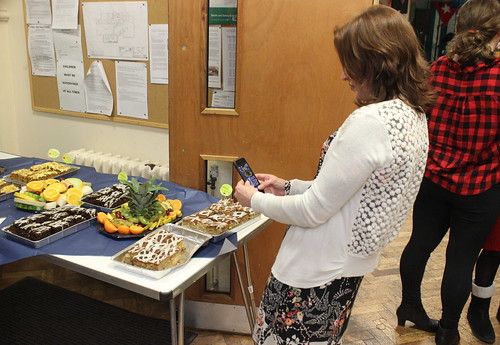20th Sunday in Ordinary Time (B)
Picture: cc John Geoffrey Walker
My dear friends, if I were to ask you, which part of your body you use to eat, what would you say? To be honest, until quite recently, I would have considered this a stupid question. Which other part of my body can I eat with if not my mouth?! Of course, I’m aware that patients in hospitals sometimes need to be fed through a tube in a nostril, or a needle in the arm. But those occasions are rare. For the most part, we all eat only with our mouths… don’t we?
And yet, as anyone who has ever watched a cooking competition on TV, or posted a photograph of their favourite dish on social media, knows very well, before food ever passes into our mouths, we often devour it first with our eyes. Isn’t this why the home-cooks on MasterChef are judged not just on culinary technique, but also on plating skills? Not just on how their food tastes, but also on how it looks? And don’t we all know what it feels like to salivate at the mere sight of a delicious bowl of curry laksa, or chilli crab? All of which gives a whole new meaning to the words, watching what we eat!
Increasingly, perhaps now more than ever, people are realising that we eat not just with our mouths, but also with our eyes. Involving not just our sense of taste, but also our senses of sight and smell, of touch and hearing as well. But if this is true of the food that fills my belly, what about the kind that satisfies my soul? With which part of myself do I eat spiritual food? This, I believe, is the crucially important question that our Mass readings invite us to ponder today.
As he has been doing over the past two Sundays, in the gospel, Jesus continues to encourage people, encourage us, to eat the flesh of the Son of Man and drink his blood. For unless we do, we cannot have life. As a result, his listeners are filled with shock and dismay. How can this man give us his flesh to eat?, they ask. And I have to confess that there’s a part of me that feels superior to these people. A part of me that considers theirs a stupid question. For, as a Catholic who regularly receives Holy Communion, I think I know exactly what Jesus means. What else can it mean to eat the Lord’s flesh and to drink his blood, if not to join the queue at the right time at Mass, and to pop a communion wafer into my mouth, after mumbling an Amen in response to the words The Body of Christ?
And yet, if this is all it takes to eat the Lord’s flesh and to drink his blood, then isn’t it the same as saying that, unlike material food, spiritual nourishment can be eaten with one’s mouth alone? But can it? Really? Careful attention to the other Mass readings actually leads us to the opposite conclusion.
In the first reading, after building a restaurant, and preparing a gourmet menu, we’re told that Lady Wisdom then invites the foolish and the ignorant–all those who have no knowledge of the ways of God–to feast at her table. And, once again, it’s helpful for us to pose the question, With which part of themselves are the invited diners expected to eat this food? Lady Wisdom herself provides the answer at the end of the reading. Leave your folly and you will live, she says, walk in the ways of perception.
But which part of my body must I use to obey this instruction? How do I go about forsaking foolish, worldly, self-indulgent ways? How do I walk instead in the ways of God, the way of Christ, the Source of heavenly Wisdom, who himself walked the Way of the Cross, the way of loving self-sacrifice? Can I do this with my mouth? Yes, of course. And not just by placing a communion wafer on my tongue. But also, as the psalmist reminds us, by blessing the Lord at all times. By allowing God’s praise to be always on my lips. This is how one can taste and see that the Lord is good. Even so, it’s also quite obvious that it’s not enough to walk in the ways of Wisdom simply with my mouth. I need to do it also with every other part of my body. With my arms and my legs. With my mind and my heart. And yes, with my whole life as well!
Isn’t this also what we find in the second reading, which reminds us to be very careful, not just about what we put into our mouths, but also about the sort of lives we lead… And notice how the reading proceeds to present us with several sharp contrasts. Between senseless and intelligent people. Between those who are thoughtless and those who are able to recognise what is the will of the Lord. Between those who live lives of dissipation and self-indulgence, and those who are filled with the Spirit, who allow their lives to be directed by the love of God. In other words, what is the second reading encouraging us to do, sisters and brothers, if not to watch what we eat? To watch not just what we put into our mouths, but also what we allow to occupy our minds and hearts. How we lead our very lives.
All of which might prompt us to examine our celebration of the Sunday Eucharist. And, in particular, how we receive Holy Communion. For, if it is indeed true that I’m called to eat and drink spiritual food not just with my mouth, but also with my mind and heart and life, then perhaps Communion requires from me not just my reception, but also my commitment. So that when I say Amen to The Body of Christ, I’m not just expressing my belief in the Real Presence of Christ here in this church, but also everywhere else in my life. By saying Amen, I am also expressing my desire and determination to be mindful of that loving and merciful Presence wherever I go. Pointing it out to whomever I meet. Ever pondering and praising the wonders of God in my life and in our world.
Sisters and brothers, many people these days quite literally watch what they eat, by enthusiastically sharing and devouring colourful images of delicious food on social media. As we prepare to approach the Altar of the Lord in a few moments, what must we do, you and I, not just to watch what we eat, but also how we go about eating it today?


